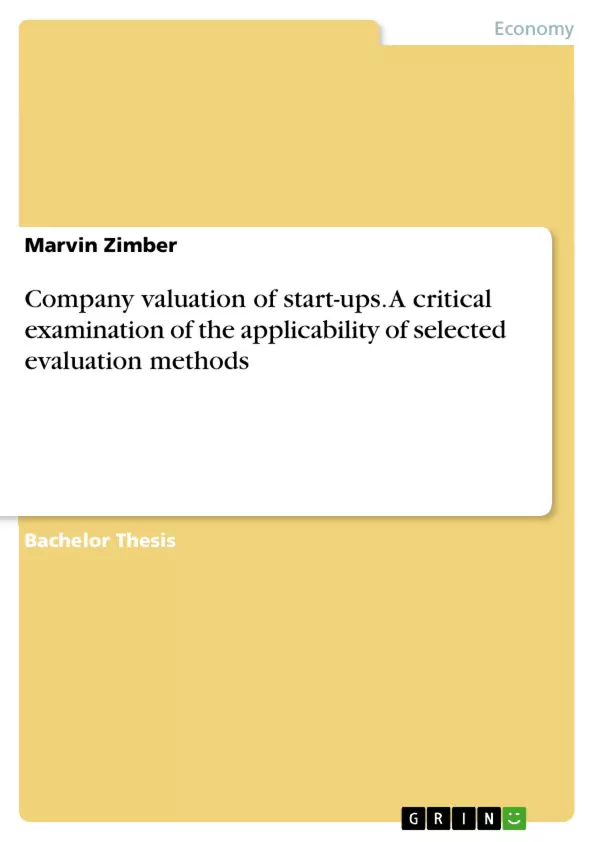In this bachelor thesis it is to be examined to what extent the traditional valuation methods are also suitable for the company valuation of start-up companies. The aim is to work out where the possible strengths and weaknesses of the evaluation methods in relation to start-ups that are used in established companies lie.
At the beginning, the characteristics of a start-up company are characterized. Subsequently, general principles of a company valuation are to be explained. Here, a brief reference is also made to the most important value determinants. This section concludes with the requirements for assessment procedures for start-up companies. The suitability of the selected evaluation methods for a start-up evaluation should then be checked.
Individual, common assessment procedures are then discussed in more detail and a distinction is made between overall assessment procedures, individual assessment procedures, mixed procedures and situation-related procedures. After the subsequent example evaluation, the corresponding conclusions from the illustrated applicability of evaluation methods for start-ups are shown in the conclusion.
Inhaltsverzeichnis (Table of Contents)
- 1 INTRODUCTORY
- 2 CHARACTERISTICS OF A START-UP COMPANY
- 2.1 Life cycles of companies and products
- 2.2 Definition of start-ups
- 3 REQUIREMENTS OF THE EVALUATION METHODOLOGY
- 3.1 Definition of enterprise value
- 3.2 Functions of company valuation and valuation occasions
- 3.3 Value determinants of a company valuation
- 3.3.1 Cash Flow
- 3.3.2 Terminal Value
- 3.3.3 cost of capital
- 3.3.4 Multipliers
- 3.4 Requirements for the evaluation procedure for a start-up
- 4 EVALUATION PROCEDURES AND THEIR APPLICABILITY
- 4.1 Overall valuation method (net present value oriented)
- 4.1.1 Earned value method
- 4.1.2 Discounted Cash Flow Method (DCF)
- 4.1.2.1 Weighted Average Cost of Capital
- 4.1.2.2 Adjusted-Present-Value
- 4.1.3 Applicability of capital value-oriented procedures in start-up companies
- 4.2 Individual valuation procedure (net asset value oriented)
- 4.2.1 Net asset value method
- 4.2.2 Applicability of value-oriented procedures in start-up companies
- 4.3 Mixing process (market value oriented)
- 4.3.1 Multiplier method
- 4.3.2 Applicability of market value-based methods
- 4.4 Situational procedures
- 4.4.1 Venture Capital Procedure
- 4.4.2 Applicability of situational procedures
- 5 EXEMPLARY APPLICATION OF A START-UP COMPANY VALUATION
- 5.1 Short presentation of the start-up "HelloFresh SE"
- 5.2 Company valuation using the VC method
- 5.2.1 Investigation of the current market position
- 5.2.1.1 Market volume/ growth rate
- 5.2.1.2 Market share of HelloFresh SE
- 5.2.1.3 Analysis of the most important markets
- 5.2.1.4 Analysis of the food market
- 5.2.1.5 Summary and outlook
- 5.2.2 5-Year Forecast HelloFresh SE
- 5.2.3 Calculation VT
- 5.2.4 Calculation VO
Zielsetzung und Themenschwerpunkte (Objectives and Key Themes)
This thesis examines the applicability of selected assessment procedures for valuing start-up companies. The work aims to provide a comprehensive analysis of different valuation methodologies and their suitability for assessing the value of early-stage enterprises.- Characteristics of start-up companies and their specific life cycles
- Requirements of a suitable valuation methodology for start-ups
- Examination of various valuation procedures, including their advantages and limitations for start-up evaluation
- Applicability of different valuation methods, such as discounted cash flow, net asset value, and multiplier methods
- Exemplary application of a valuation procedure using the case study of "HelloFresh SE"
Zusammenfassung der Kapitel (Chapter Summaries)
- Chapter 1 provides a general introduction to the topic of start-up company valuation and outlines the scope of the thesis.
- Chapter 2 defines the characteristics of start-up companies and their life cycles. This chapter highlights the specific challenges associated with valuing these entities.
- Chapter 3 focuses on the requirements of a suitable valuation methodology for start-ups. It defines key concepts, including enterprise value, valuation occasions, and value determinants.
- Chapter 4 examines various valuation procedures and their applicability in the context of start-up companies. This chapter analyzes methods like discounted cash flow, net asset value, and multiplier methods.
- Chapter 5 presents an exemplary application of the Venture Capital (VC) valuation method using the case study of "HelloFresh SE". This chapter investigates the company's market position, provides a 5-year forecast, and demonstrates the VC method's application.
Schlüsselwörter (Keywords)
This thesis focuses on the valuation of start-up companies, analyzing various methods like discounted cash flow, net asset value, and multiplier methods. It explores the applicability of these procedures in the context of early-stage businesses, taking into account specific characteristics of start-ups and their life cycles. The thesis utilizes the case study of "HelloFresh SE" to demonstrate the practical application of a VC valuation approach. Key terms include company valuation, start-up characteristics, life cycle analysis, valuation methodology, discounted cash flow (DCF), net asset value, multiplier method, and Venture Capital (VC).Frequently Asked Questions
How do you value a start-up company?
Common methods include Discounted Cash Flow (DCF), Multiplier methods, and the Venture Capital (VC) method, though each has limitations for early-stage firms.
Why is the DCF method difficult for start-ups?
The DCF method relies on stable future cash flows, which are highly uncertain and often negative in the early life cycles of a start-up.
What is the Venture Capital (VC) method?
The VC method calculates value based on an expected exit value and the required rate of return for the investor at a specific future point.
How was HelloFresh SE valued in this thesis?
The thesis uses HelloFresh SE as a case study to demonstrate the application of the VC method, including market analysis and a 5-year forecast.
What are the specific characteristics of start-ups?
Start-ups are characterized by innovative business models, high growth potential, but also high risk and lack of historical financial data.
- Arbeit zitieren
- Marvin Zimber (Autor:in), 2018, Company valuation of start-ups. A critical examination of the applicability of selected evaluation methods, München, GRIN Verlag, https://www.grin.com/document/1187808



